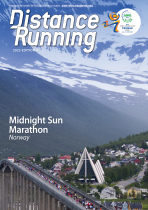Running into history
01 January 2014, 8am UTC
A marathon survivor
Come Hell – for the runners – or high water – for the organisers – the Rotorua Marathon will be held for the 50th time on Saturday 3 May 2014. The very first edition was run back in 1965, when a field of sixteen runners lined up to face the starter: eleven of them completed the course, an ‘anti-clockwise’ journey around Lake Rotorua, in the North Island of New Zealand. For reasons of traffic management the race direction was changed to clockwise in 1977, as this made it easier to negotiate several road crossings.
What makes the Rotorua event unique is its geographical identity. The perimeter road around Lake Rotorua measures almost the exact marathon distance of 42,195m.
The race was first organised by the Rotorua Athletic Club and in the 1990s by the Lake City Athletic Club. Sponsorship from the Fletcher group of companies covered the first 35 years of the race’s life, from 1965 to 1999. It was this long standing sponsorship, along with good organisation, that attracted a ‘who’s who’ of New Zealand’s greatest distance runners.
One has only to look at the event’s Hall of Fame to see who has competed at Rotorua and who has gone on to perform at the highest level in the Olympics and Commonwealth Games. Olympian and legendary runner Jack Foster, who coincidently lived in Rotorua, is a four-time winner of his home town event.
With the running/jogging boom of the late 1970s and 80s entries increased to what was, and still is, a record field for the full marathon distance in New Zealand. A total of 6364 entries were received for the 25th event in 1989: 5967 started and 5859 finished that race. This was before the dawn of electronic chip timing, and all finishers were hand timed and scored.
Race records for the marathon are held by Paul Ballinger, who ran 2:16:05 in 1988, and Nyla Carroll, who recorded 2:37:37 in 1994. These records are quite outstanding: in recent times it has been disappointing that the men have not broken the 2:20 barrier since 1994 and over the same period no woman has run faster than 2:40.
The Rotorua organisers faced what may have been an unfortunate world first in 1999, when the 35th event was cancelled on race morning only 10 minutes before the 10.00 start, because of a torrential downpour over the Rotorua basin. This caused flooding throughout the city and washouts on the course at the back of the Lake. A total of 190mm of rain fell in a 12-hour period.
The Rotorua Marathon Survivors Club was formed in 1993, when 29 runners were inducted in to the Club in recognition of them each having completed 15+ Rotorua Marathons. Membership has since grown steadily, and has now reached a total of 443. Colin Smyth (Mr Rotorua Marathon) has 48 Rotorua finishes to his name, while a number of others have more than 30 finishes, including Verna Cook-Jackson who has completed 33.
During the years since Fletcher’s involvement with the race ended other sponsors have included Bartercard New Zealand Ltd (2000-2001), Fletcher Challenge Forests (2002-2003), Tenon (2004) and, since 2005, the current sponsor The Lion Foundation.
Several people from the Lake City Club who were at the helm of the event wished to lighten their load so Athletics New Zealand took over ownership in 2000. Three years ago Event Promotions Ltd, Rotorua, were appointed as the event managers, with Athletics New Zealand retaining ownership.
The new management team introduced a half marathon in 2011 to give people the opportunity to build up to the full marathon distance. The weekend’s programme also caters for those seeking shorter distance events: a 5km and quarter marathon (10.5km) have been added to encourage people to gradually step up towards completing the full circuit of the Lake, especially for this year. The field attracted to the 50th anniversary event could finally surpass the participation record set in the 25th anniversary edition.





